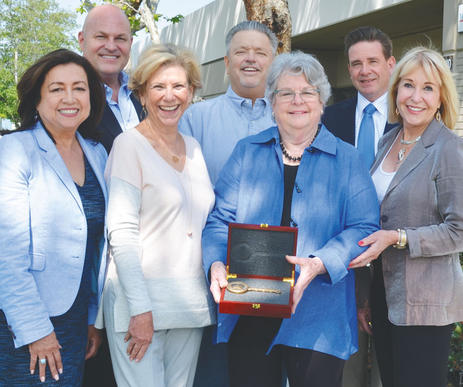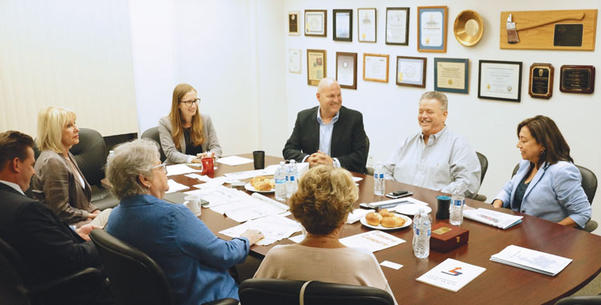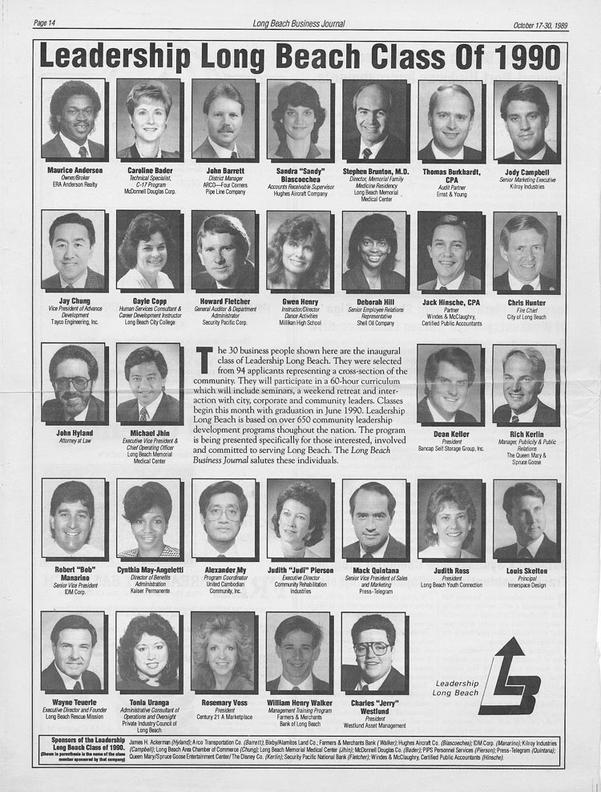Nearly 30 years after they became members of the first graduating class of Leadership Long Beach, seven people gathered at the Business Journal office to reflect upon their experience with the nonprofit, how it had helped shape them and how it continues to inspire local leaders.
The graduates included: Gayle Clock, retired, who was a human services consultant and the career development instructor at Long Beach City College in 1990; Rich Kerlin, owner of a small marketing agency, who was then the communications director for the Queen Mary and Spruce Goose Entertainment Center; Judy Ross, retired, who at the time had taken a job within the Long Beach Health Department and later became the executive director of the Long Beach Nonprofit Partnership; Tonia Reyes Uranga, consultant and former Long Beach City Councilmember, who was then a consultant for the Private Industry Council; Rosemary Voss, owner of Voss Consulting, who was the owner of Century 21 A Marketplace; Henry Walker, president of Farmers & Merchants Bank, who had been working at the bank for two years at the time; and Jerry Westlund, owner of a chain of nightclubs throughout the country who was then president of Westlund Asset Management.

Members of the first class of Leadership Long Beach gathered at the Business Journal to reflect on their experience. They are pictured here with a key to the city bestowed to the nonprofit organization. From left: Tonia Reyes Uranga, consultant and former Long Beach 7th District councilmember; Rich Kerlin, owner of a marketing agency; Judy Ross, former executive director of The Nonprofit Partnership; Jerry Westlund, owner of a string of national nightclubs; Gayle Clock, former human services consultant and career development instructor at Long Beach City College; Henry Walker, president of Farmers & Merchants Bank; and Rosemary Voss, owner of Voss Consulting. (Photograph by the Business Journal’s Pat Flynn)
Formed in 1990 by whom Walker referred to as the “old guard of Long Beach,” Leadership Long Beach (LLB) took the shape of a nonprofit dedicated to informing, activating and connecting community leaders to more meaningfully serve the city. The organization operates on these principles: community, inclusiveness, informed leadership, trusteeship and principled leadership.
The Leadership Long Beach Institute, a 10-month program open to any adult who lives or works in the city to apply, combines experiential learning with in-depth dialogue to help participants grow their knowledge of the Long Beach community. It includes monthly sessions with presentations by local leaders, a weekend retreat and a culminating class project. The Institute was the organization’s first program, and LLB has since expanded to offer youth and executive leadership programs as well.
The handful of members from the first Institute class took some time to settle in for the interview with the Business Journal – after all, they hadn’t been in one place together for nearly three decades. They had come to LLB from varying backgrounds and professions, with differing views on many topics – but the program, they reflected, had brought them together.
“For me, what I learned most was that at the end of the day it’s all about relationships with people who have much more in common with you than they are different than you,” Kerlin said.
Each of them had applied to participate in the first class of LLB for their own personal development, but also to expand their connections within and to the Long Beach community. Voss said she had first found out about the program through an article in the Press-Telegram. “I read about it and I thought, this is really a great way to learn about the city,” she said. “And, as a realtor, I thought, I’m kind of an ambassador for the city. We don’t just sell houses, but we sell the surrounding areas. So I wanted to learn more.”
Clock had seen the program as a chance to approach the concept of leadership in a new light. “I was really disenchanted with elected leadership at that time and I felt that they often let us down as people in the community,” she recalled. “And this offered an opportunity to talk about leadership in a totally different way.” After participating in the program, she said she began to see possibilities not just in herself, but in all those around her. “[The idea that] wherever I was, I could live from the principles of leadership and be a functioning leader and impact other people’s lives was really meaningful to me,” she said.
Westlund pointed out that the Institute presented an opportunity for people from different professions, who would never typically interact, to get out of their bubbles. “There were 30 lanes on the highway here, you know,” he said, gesturing to the 1990 graduating class roster, which was on the conference table. “Henry talked banking and what he does. You talked to realtors,” he said, referencing Voss. “It taught me – and I use this every day across the country in the stuff that I do – if I don’t like the direction I’m going here, let’s go to the next channel. Because there are multiple layers to how a community operates and [how] decisions are made.”
Uranga said she had applied to the program to expand her horizons and to serve as a voice for the community. She had particularly wanted to ensure that the Latino community was in the mix, as organizations “tend not to have a lot of diversity,” she noted.
“I was active in my schools [and] in the community in Central Long Beach and Westside, so that wasn’t the problem. I guess what it helped define was what the definition of community is,” Uranga said. “I was able to expand what it really means to be involved in your community, and that helped me grow. Also, in terms of leadership, it helped me consider other areas. I ran for office, and it took a while, but I won. It was something I didn’t think I would ever be able to do if it weren’t for this,” she said. Uranga served as councilmember for Long Beach’s 7th District from 2002 to 2010.
Kerlin called Leadership Long Beach “fundamental” to his leadership development and involvement in the community. “I was young, inexperienced, unconfident. And it taught me the fundamental principle of getting out of self for the greater good of the community, and that giving back and serving others was integral to leadership,” he said.
“It really opened my eyes to so many areas of the community, the city, that I really didn’t know about,” Ross said. “I think that was a real broadening experience for me in learning about various businesses, various economic struggles that both businesses and [the] government were experiencing, and other communities were experiencing.”

Members of the first class of Leadership Long Beach who graduated in 1990 came together at the Business Journal’s offices to discuss what the organization has meant to their personal development and to the community. Pictured counterclockwise from right, are: Tonia Reyes Uranga, who was a consultant for the Private Industry Council in 1990; Jerry Westlund, who was president of Westlund Asset Management; Rich Kerlin, who was then the communications director for the Queen Mary and Spruce Goose Entertainment Center; Business Journal Editor Samantha Mehlinger; Rosemary Voss, who was the owner of Century 21 A Marketplace; Henry Walker, who had worked at Farmers & Merchants Bank for two years at the time; Gayle Clock, who was a human services consultant and career development instructor at Long Beach City College; and, with her back to the camera, Judy Ross, who at the time worked for the Long Beach Health Department. (Photograph by Oscar Cosby, Leadership Long Beach)
Although Walker is the fifth generation of a long-time Long Beach family, he noted that he did not actually grow up in the city, so participating in LLB gave him a greater understanding of the area. “It absolutely helped create a foundation for me in the understanding of the community,” he said. “And it has also helped me as I have traveled through my professional career here through Long Beach to continue to have empathy and understanding for all the different communities within our great city.” He noted that he has encouraged multiple F&M managers and executives to go through the Institute.
Voss’s LLB experience reinforced her commitment to giving back to the community and helped her to see that each individual is capable of leadership in whatever they do. “An example is [that] mothers are some of the greatest leaders. And by their actions [they] show us how to behave and how to respond and how to act,” she said. “So my feeling with all the people that I worked with or mentored over the years was, you are a leader in what you’re doing.”
The first class of the Leadership Long Beach Institute graduated the program on the precipice of a precarious time for the city. “[Some] thing that was going on about that time was the Navy was pulling out, so the whole city was being resurrected and trying to figure out: what is our city about?” Ross said. Walker chimed in, “It was a tough economic time.”
Uranga pointed out that there had been issues stemming from police brutality and that, just two years after their class graduated, the Los Angeles riots occurred. “The first class got together after and said we need to do something. . . . We need to do something so this city isn’t torn apart,” she said. Uranga held a community meeting at her home in Wrigley. “People had to drive down Willow and make a left, and they had to drive by Pacific and Willow where the DMV was burned down. It had been trashed.”
Voss pointed out that the United States had entered a recession in the early 1990s. “What I didn’t know at the time, we were entering one of the biggest real estate recessions we would have,” she recalled, noting that home values had dropped by half in some cases.
The 1990s were also a difficult time for the city’s hospitality and tourism industry, Kerlin noted. In 1990, Disney had announced plans to transform Long Beach’s waterfront adjacent to the Queen Mary, which it operated at the time, into a concept dubbed “Port Disney.” But Disney canceled the project in 1991 and pulled out of the Queen Mary lease the following year.
“In those tough times, I think because we had been through Leadership Long Beach, we had a different sense of responsibility for what was going on in the city,” Clock said. “And we didn’t go out as a group and work, but I think we did continue to support the city on our own paths.”
When asked about the importance and value of Leadership Long Beach to the community, Voss said that its impact occurs “one person at a time.” Westlund agreed. “How do you eat an elephant? One bite at a time,” he said.
These LLB graduates have continued to follow the organization, and a few noted that some changes in support and participation may not have been for the best. Westlund noted that, for some time, there seemed to be more government employees than private sector professionals in the program.
Uranga pointed out that some of the strong local financial backing for the organization has since gone by the wayside. “Now that you have institutions or corporations that are more . . . regional in nature, you don’t have that investment in one community the way we did in the past. And I think that’s a little sad, because Long Beach is the second largest city in L.A. County,” she said. People who make money in Long Beach and invest throughout the region should also invest in Long Beach and in LLB, she said. “I don’t know how much corporate sponsorship we have now. But certainly, we had the best and brightest corporate sponsorship in 1990.”
Moving forward, Uranga said her first hope for Leadership Long Beach is that it retains financial stability. “The second is that we continue to redefine what we think the City of Long Beach is . . . . Because, as the people change in the city, so does our vision of what Long Beach is,” she said.
Ross said the LLB experience was “the beginning of a love affair with the city” for herself and her peers. “I would hope in the years to come that all classes would have that feeling, and the opportunity to really embrace the city as a whole.”
Jeff Williams, executive director of Leadership Long Beach, said that applications for the next class are available at the organization’s website, leadershiplb.org, through June 25. “Becoming a part of the 20th class of Leadership Long Beach is an opportunity to join a legacy of leaders committed to making our community better,” he said.

An announcement in the October 17-30, 1989, edition of the Business Journal listing the first class of Leadership Long Beach.
